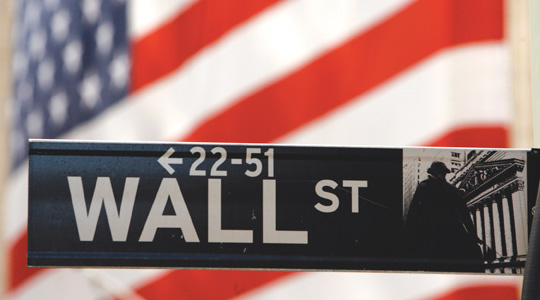
In his classic "Bonfire of the Vanities," Tom Wolfe’s Masters of the Universe were thinly disguised Wall Street megalomaniacs suffering from gluttonous edacity. Today, there is no longer any need for disguise. They flaunt it openly before congressional committees, oblivious to growing public anger about what retired Master of the Universe Pete Peterson calls their "carnivorous, animalistic greed." This time, the race to the trough supersedes party labels. Democrats and Republicans slurped in almost equal measure.
The total bonus pool at the end of 2009 for the nation’s six biggest banks was $130 billion (Goldman Sachs alone $23 billion). CEOs plead the need to pay staggering amounts to partners so they won’t be poached by rival houses. Yet some 200,000 jobs were lost in financial houses during the worst economic crisis since the Great Depression, including many senior executives. Others compare themselves to movie and sports stars, candidly confiding they also have to maximize their peak earning years.
The Treasury Department estimates total bank repayments from the Troubled Asset Relief Program, drawn from U.S. taxpayers, should exceed $175 billion by the end of this year. This would cut total taxpayer exposure to the banks by three-quarters. But Wall Street’s captains are now in high dudgeon over a government levy on the banking industry for losses Treasury says it will incur in the melee, or minus $120 billion to the taxpayer on the $700 billion in TARP lending to 21 financial institutions. Some of the major houses – including JPMorgan, Morgan Stanley and Bank of America – have long since repaid everything with interest.
Michael J. Boskin, one-time economic adviser to George H.W. Bush, says investors no longer trust economic and fiscal stats and are "increasingly inclined to disbelieve them." To base decisions on misleading, biased or manufactured numbers, says Boskin, is "dangerous." Cynicism over official stats is growing.
The lobbyists in orbit around Capitol Hill are making sure that whatever comes out of Congress to curb the Obama administration’s levy appetite will also be a No Lobbyist Left Behind Act, including the 3,000 (out of 13,200) who suddenly became consultants rather than face more elaborate reporting requirements – and potential criminal liabilities. It is now a crime for lobbyists to buy meals or provide gifts to lawmakers or their aides.
Meanwhile, the ranks of the unemployed, underemployed and those whose jobless benefits expired are around 27 million. These days, low-pay-no-benefits jobs are considered good deals.
The widening gap between "les miserables" and what looks like the old Soviet caricature of America’s uber-capitalist, chomping on a Havana cigar and flashing a pinky diamond, doesn’t seem to bother high-powered execs testifying before congressional committees. Some Wall Street CEOs even admitted their mistakes were partly responsible for the worst economic and financial conditions since the Great Depression.
Phil Angelides, chairman of the Financial Crisis Inquiry Commission and a man who lost the 2006 California governor’s race to Arnold Schwarzenegger, said after a day of hearings, "It sounds to me like selling a car with faulty brakes and then buying an insurance policy on the buyer." But there is still a reluctance to see any connection between mansions in the Hamptons and the millions of houses still caught in subprime mortgage contagion.
Companies that downsized to weather the crisis are climbing back into black territory with fewer workers through offshoring and automation. Employers are looking for opportunities to downsize permanently. What a piece in "Bloomberg BusinessWeek" called "the era of the disposable worker" and "diminishing job security" means a "widening gap between the highest and lowest-paid workers."
There is also a Conference Board survey released Jan. 5 that found only 45 percent of workers surveyed "were satisfied with their jobs, the lowest in 22 years of polling, (and) poor morale can devastate performance."
Clearly, these stats and a new era of "temps" mean employers save on retirement plans and health costs. But all this also points to social upheaval. Part-timers who cannot find full-time employment are estimated at 10 million. Stock prices of temp agencies are booming; Manpower Inc.’s profits are up 50 percent.
Equilar, a compensation tracking firm, showed that Goldman Sachs’ Lloyd Blankfein earned $210,169,732 from 2003 to 2007. Asked about his company’s practice of betting against stocks it sold to clients, he explained that once they were held by others, they were no longer the property of the bank. Brilliant. But then why would they tout to their clients stocks they knew were about to head south because they planned to short them? Waffle machine clicks in again.
"We may trade, and may have existing positions, based on trading ideas before we have discussed these trading ideas with you," said an e-mail from Thomas C. Mazarakis, the head of Goldman Sachs’ Fundamental Strategies Group. Q.E.D.!
Betting against instruments that the same house recommended is not unusual. Aren’t those conflicts of interest? Congress is also investigating how major Wall Street firms bundled subprime mortgages, called them "collateralized debt obligations" and then sold them to investors while at the same time betting against them.
Both political parties have to gauge carefully how far they can push Wall Street. Its richly rewarded honchos also hold aces-high cards for expensive TV commercials come campaign time. For the first nine months of 2009 the banking industry spent more than $344 million on lobbying, giving Wall Street muscle on the Hill. Stealing a line from Captain Renault in Casablanca, the bankers were shocked that anyone could think there was any connection between their lobbyists and their actions.
Arnaud de Borchgrave, a member of the Atlantic Council, is editor-at-large at UPI and the Washington Times. This essay was syndicated by UPI as "Hyper executive compensation." Photo: Times of Malta.
Image: wall-street-us-flag.jpg
